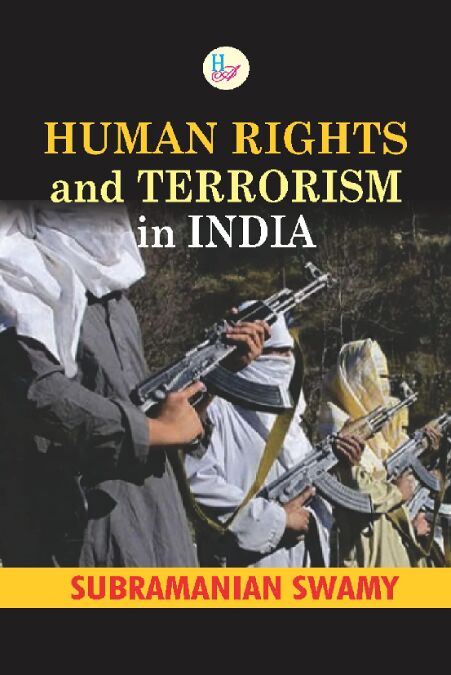A liberating force?
In his book — Human Rights and Terrorism in India — Subramanian Swamy comes out with the method of combating terrorism while keeping human rights intact, through the perpetually evolving concept of identity; Excerpts:

International terrorism began and proliferated in the late 1960s. Between 1960 and 1967 there was a high incidence of aerial hijackings of civilian aircraft and taking of passengers or hostages. Most of the incidents were, however, committed for private or personal reasons by persons seeking political asylum, escaping criminal process, evading family responsibilities, suffering from psychological disturbances, etc.
In 1968, aerial hijacking and the taking of hostages acquired a political colour. The Popular Front for the Liberation of Palestine (PFLP), a part of the PLO, began hijacking for political blackmail. It was initiated in April 1968 with the seizure of an El Al Israel airliner which was commandeered to Algiers.
The erstwhile Soviet Union, which patronized terrorism as "revolutionary" violence, became itself affected by politically motivated hijacking. Even then it continued to extend international support to those nations and organizations which had supported terror such as Syria, Iraq, Libya, and PLO. An informal terror network soon emerged.
The International Department of the Central Committee of the Communist Party of the Soviet Union, the Soviet Security Agency (KGB), and the Soviet Military Intelligence (GRU) played the major role in building and guiding this terror network. Of these three organs of the Soviet state, the Party's International Department, headed by Boris Ponomarev, had been the most important Soviet agency for mobilizing and facilitating support of terrorism. The Department consistently promoted widespread "revolutionary violence," even while taking care to project the illusory image that the Soviet Union was abiding by the "spirit of peaceful co-existence." Setting the tone for the real mission of the Department, Ponomarev declared in 1964:
We understand our international duty as consisting in support for all the revolutionary, democratic movements of modern times.... We Soviet Communists call upon all the fraternal parties and all the revolutionary forces to close their ranks more tightly, to overcome all difficulties, to rally under the banner of Marxism-Leninism in the name of the triumph of the working class.
Ponomarev drew sustenance from Das Kapital wherein Karl Marx had opined: "Force (Gewalt) is the midwife of an old society which is pregnant with a new one." Writing in 1848, Marx expressed a strong belief in the necessity of political violence: "Only one means exists to shorten the bloody death pangs of the old society and the birth pangs of the new society—revolutionary violence."
To facilitate these activities, Joseph Stalin had established the Lenin Institute (also known as the Institute of Social Studies, the Institute of Social Sciences, or the International School of Marxism-Leninism), located in Moscow. It taught the art of terrorism in the name of "revolutionary violence."
In 1958, Khrushchev had gone further to found Patrice Lumumba Friendship University at Moscow, to serve as a base for the indoctrination and training potential young "freedom fighters" from the Third World who were not Communist Party members. Specialized training in terrorism was provided in Baku, Odessa, Simferopol, Tashkent, and in the suburbs of Moscow. At these locations the techniques of guerrilla warfare and other skills – including the use of explosives, mining of transportation routes, commando field tactics, and the combat capabilities of shoulder-fired rockets were taught.
For example, the Soviet Union played a role in the establishment of the Solidarite and Aide et Amitie terrorist network in Paris. This network connected illegal groups, among them being the Popular Revolutionary Vanguard (VPR) in Brazil, the Movement of the Revolutionary Left (MLR) in Uruguay and Chile, the Quebec Liberation Front (FLQ), and the African National Congress (ANC) in South Africa, as the new Communist doctrine.
This doctrine was based on Marx's other writings, and in the works of Lenin. Writing in 1906, Lenin had stated "no Marxist should consider partisan warfare (including political assassination) … as abnormal and demoralizing." On the contrary, "terrorist partisan acts against representatives of the violent regime are recommended." That is, terrorism was regarded by Lenin as a part of the "proletarian revolution," although he wanted it to be employed only under the direction of "the Party." On the other hand, Lenin condemned individual acts of terror i.e., outside Soviet control, as "infantile," or "isolated" political violence.
Leon Trotsky unequivocally justified the resort to terrorism as a tactical tool of partisan warfare. While Trotsky had been disowned by Stalin, his endorsement of terror as an instrument of revolution remained embedded in Communist Party doctrine. The 2012- 2015 happenings in Nandigram, in West Bengal, confirmed that terror is an integral part of Communist mindset anywhere and everywhere, reformist or doctrinaire.
(Excerpted with permission from Subramanian Swamy's Human Rights and Terrorism in India; published by: Har-Anand Publications)



